Deborah J. Ross's Blog, page 34
November 2, 2021
Book Release Day: Among Friends (stand-alone novelette)
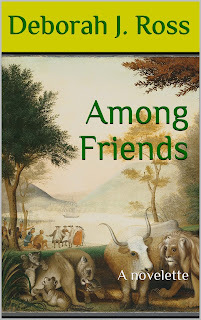
In pre-Civil War Delaware, farmer Thomas Covington is part of a network of Quakers who help escaping slaves headed north. When he shelters a runaway, a slave-catcher comes calling…only it’s not human. The hunter is an automaton, relentless and incapable of mercy. Dealing with the automaton will test Thomas’s Quaker belief that there is “that of God in every person,” and force him to consider whether the mechanical intelligence may beenslaved by its programming, leading tounexpected questions for the Abolitionist movement.
One of my favorite pieces of short fiction in recent years, first published in The Magazine of Fantasy and Science Fiction, reprinted in The Shadow Conspiracy III. Here I read from the beginning, to give you a taste.
If you enjoyed the story, please leave a review! Here's where you can find it.
Barnes & Noble, Kobo, Apple, and other vendors:

November 1, 2021
A Few Thoughts on Technology and Transitions

generation, whether they are our own children or someone else’s. In my personal life, my younger daughter dragged me, kicking and screaming, into the world of social media, into getting my first stupidphone, and later into video chatting (during her years of medical school on the other side of the country). Now these technologies are part of my everyday and work life. They've saved my sanity during the pandemic.
I think it’s good to keep learning new things, to use our minds and bodies in different ways. One of the challenges of these new computer-based technologies is that they require us to use different methods of thought. The transition, for example, from keyboard-based word processing programs (like WordStar for DOS, the one I first used) to graphics-based (Windows) programs entailed a different logic and hand coordination. And both of them are a far cry from the typewriter I used to write my first published stories.
My very first stories (actually, my first umpteen attempts at novels) were written by hand in composition books or on scratch paper. I remember reading an interview with the British mystery writer Dick Francis, in which he described writing in ink in composition books (and that it had never occurred to him that a story, once written, could be revised!) so the method is definitely a time-honored one. Once I learned to type (in high school, on those really heavy manual typewriters) that became my preferred method, although when my children were small, I always carried a spiral-bound notebook on which to work on the Story of the Day in odd moments. Retyping a revision was a major chore, since I had to do it myself. I became expert in the application of white correction fluid. At least carbon copies were no longer necessary, but I had to take my finished manuscript to a copy shop because in those days no one owned a home copier.
I am of several minds about whether the ease of making changes as I go, being able to print out a manuscript at any stage, and so forth, have really changed how I write. I love the saying that the most important word processor is your brain. Perhaps I splat over the page, as it were, more spontaneously when I use a computer just because it’s so easy to tidy up my prose later. That can be a good thing as I follow whatever wacky idea pops into my mind. Some of them are truly best expunged but others are quite juicy. In some ways I am more focused now than in 30 or 40 years ago; I know much more about how to put a story together, even if it isn’t one I’ve outlined.
Having multiple writing media available to me is a great thing. I often go back and forth when I’m stuck, especially between dictating and typing or typing and longhand. Dictation using voice recognition software is especially great for dialog or speeches (can you see me acting out the parts of the various characters?) Just as we don’t all write in the same way, I don’t write in the same way all the time. Sometimes words flow and then I want the medium that allows me to best keep up with them. But other times I’m stuck (or sulky, or distracted, or tired) and switching can help get things rolling again.
In the end, though, the only version that matters is the one in the hands of the reader.

October 29, 2021
Book Reviews: Magical London, Three Views
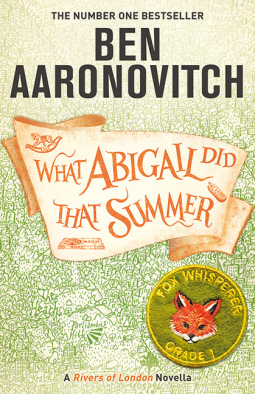 What Abigail Did That Summer, by Ben Aaronovitch (Subterranean)
What Abigail Did That Summer, by Ben Aaronovitch (Subterranean) Lies Sleeping, Ben Aaronovitch (DAW)
Best Thing You Can Steal, by Simon R. Green (Severn House)
I very much suspect that one night, Simon R. Green, Charles Stross, and Ben Aaronovitch met in a pub, got drunk together, and started telling tall tales about creepy things happening in London. Stross’s “Laundry Files” novels center on a secret agency tasked with keeping Lovecraftian Elder Gods in check. In Aaronovitch’s “Rivers of London,” waterways ancient and modern possess spirits, foxes have their own security forces, and a not-so-secret agency investigates supernatural crimes. Elsewhere I’ve reviewed some of the “Laundry Files” novels (they’re terrific fun, so check them out if you haven’t already).

My introduction to Aaronovitch’s enchanted London was reading Lies Sleeping and What Abigail Did That Summersimultaneously. It wasn’t intentional, but it turned out brilliantly. In the former, police constable and apprentice wizard Peter Grant investigates an ongoing mystery from the agency’s headquarters, “The Folly.” This is actually well into the series, which I didn’t realize, and there’s a massive amount of backstory, but I found that just hanging out with Peter was vastly entertaining. Really, a summer evening picnic, trying to get the spirit of Old Father Thames to remember where King Arthur left his sword? Delicious fun! Abigail of What Abigail Did That Summer is Peter’s cousin, and her own adventure took place back in 2018. Missing kids, a seriously psychotic haunted house, and a security detail provided by talking foxes were just a few of the marvels. Then Abigail appears in Lies Sleeping as an extraordinarily perceptive student, which makes sense given what she went through years ago. It’s no wonder the magical bosses insisted she receive proper training!
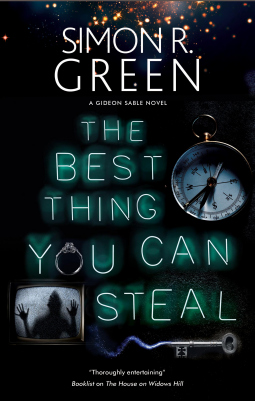
And then there’s Green’s Best Thing You Can Steal, which features a thief and con man extraordinaire, going under an assumed name. He specializes in stealing things like a ghost's clothes or a photo from a country that never existed. Now he’s after a television set that shows the future and that most delicious of prizes, revenge against “the worst man in the world.” He’s put together a team that includes a ghost who remembers being human, a man wearing the armor of the angels he’s slaughtered, the possibly human embodiment of random luck, and his ex-girlfriend, who can make technology fall in love with her. Armed with a ballpoint pen that can stop time and a skeleton key that can open any lock, not to mention their special talents and wits, he and his team go up against poltergeist attack dogs, golem guards, shaped curses, and a villain who can foresee their every move.
Each of these books is fast-paced, chock-full of inventive imagination and quirky characters. They also share a blend of off-beat bad guys, love for London and the English language, and humor that strikes me, as an American, as quintessentially British. Which is not to say they share a setting, magical systems, or histories, because each is as individual as the thoroughly skillful author who created it, only that if you enjoyed one you’ll likely find delight in the others.

October 22, 2021
Short Book Reviews: The Transformative Power of Fungi
Sorrowland, by Rivers Solomon (Farrar, Straus and Giroux)
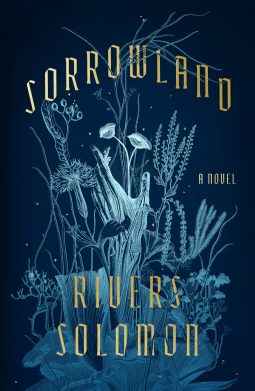
Rivers Solomon’s previous novel, An Unkindness of Ghosts, was a powerful story set on a multi-generation space ship. Now she weaves a tale of magic and racism in the American South. The story begins with a gripping sequence as pregnant Black teen Vern escapes to the woods from an oppressive cult commune. Alone she gives birth to and then raises two very different fraternal twins. From almost the beginning of her exile, she’s hunted by shadowy demons and haunted by ghosts. I confess I found it unbelievable that a girl this young could not only survive delivering twins without help but re-invent survivalism, everything from finding or growing enough food to making her own shelter and clothing. However, the story carried me along, and it turned out I was right about these feats being extraordinary and it was a piece of deliberate awesomeness on the author’s part.
This book has many layers woven together. Seemingly disparate elements, like Vern’s ability to see and later to physically interact with ghosts, are eventually tied together as Vern’s physical and emotional transformation proceeds. The skillfulness of the prose and the dynamic plot momentum gave me enough confidence that the author knew what she was doing, and with each emerging connection, that trust was amply rewarded.
Solomon is a courageous, generous writer who doesn’t shrink from facing painful and difficult material squarely. Vern’s experiences in a Black-supremacist cult and her forays into the larger world are fraught with danger, bigotry, and ugliness. Yet the story never descends into polemics and it’s not solely about racism. There’s a great deal about love and loyalty and friendship, and how these define our humanity.

October 18, 2021
Do You Outline Your Novel? Should You?
 Photo by Cleo SandaIt cannot be repeated often enough that there is no single right way to write a novel (or to compose a symphony or design a house). All these artistic endeavors require certain elements (plot, characters, tension rising to a climax, or motif and variations, harmony, contrast, or foundation, walls, plumbing, etc.) They vary in the point in the creative process at which those crucial elements must be in place, of course. Within those parameters, there’s a great deal of flexibility that allows for individual differences. What matters is not when a writer nails down the turning points, but that they are present and in balance with the rest of the book when it ends on the editor’s desk.Many writers attempt their first novels by the “seat-of-the-pants” method, that is, writing whatever pops into their heads. Sometimes they end up with dead ends (disguised as “writer’s block”) and don’t finish the work. Other times, they do finish, only to discover (either through their own perceptions or feedback from others) that the book has significant problems. So they write another draft and go through the same process until either the story works or they become so frustrated they give up, or they refuse to accept further critiques and self-publish it.
Photo by Cleo SandaIt cannot be repeated often enough that there is no single right way to write a novel (or to compose a symphony or design a house). All these artistic endeavors require certain elements (plot, characters, tension rising to a climax, or motif and variations, harmony, contrast, or foundation, walls, plumbing, etc.) They vary in the point in the creative process at which those crucial elements must be in place, of course. Within those parameters, there’s a great deal of flexibility that allows for individual differences. What matters is not when a writer nails down the turning points, but that they are present and in balance with the rest of the book when it ends on the editor’s desk.Many writers attempt their first novels by the “seat-of-the-pants” method, that is, writing whatever pops into their heads. Sometimes they end up with dead ends (disguised as “writer’s block”) and don’t finish the work. Other times, they do finish, only to discover (either through their own perceptions or feedback from others) that the book has significant problems. So they write another draft and go through the same process until either the story works or they become so frustrated they give up, or they refuse to accept further critiques and self-publish it.There’s nothing inherently wrong with such a spontaneous approach to the first draft. A good deal of the pleasure of writing is in discovery, in not knowing what will come next as the adventure unfolds. This is how children play. It does require a separate editorial, self-critical phase, at least for most of us. That’s neither good nor bad, it’s just part of the process. If you want to “pants” your first draft, you accept that you’re going to have to revise. Maybe a little, maybe a lot. Some writers loathe revision. I happen to love it.
At some point, it occurs to many of us that if we maybe thought about what was going to happen in our novel and how we were going to portray it, that we might save ourselves a bit of revision time. We might even jot down a few notes, reminding ourselves that this is just a tentative sketch and that nothing is carved in granite. We may and most certainly do change our minds when we discover that the actual story has diverged significantly from our strategy. I’ve been known to rework my notes, negotiating the borderlands between spontaneous writing and ill-thought-out plan.
Some writers never go any farther with outlining. They decide it’s not working for them, whereas it is actually not working period. Outlines help because they are a place where problems with story elements can be worked out in a relatively short time and wordage. They reduce the number of dead ends, plot holes, and inconsistencies in motivation. But in order to realize the benefits of outlining (or planning, if you’re allergic to the word outline), they require concentrated and creative problem-solving.Outlining—proper, thoughtful outlining--is exhausting. For one thing, it’s concentrated. A typical outline is 5 to 10 single-spaced pages, maybe 2000-5000 words, summarizing a work that will be 100,000 words when completed. That’s an immense amount of thought crammed into very few pages. For another thing, the actual writing of a story can generate its own positive-energy loops. You get excited by an idea that pops up, or a character takes on a life of her own and runs away with the story, or some lovely phrase or bit of dialog strikes you as so wonderful, it makes your heart sing. These moments are precious and also rare enough in actual writing. I’d venture that they are nonexistent in outlining.So outlining is energy-draining and tedious. Why then do some writers swear by it? For one thing, as I mentioned above, when done properly it saves time. For a new writer, struggling to learn the craft and working on spec, this may not seem like such a big advantage. For a writer trying to earn a living, it can make the difference between completing one book every three years and managing two or three per year. Most established writers who are able to sell “on proposal” have no choice. Editors (and agents) expect synopses (which are not exactly the same as outlines, but are interchangeable for this discussion) and sample chapters.Outlines, like pitches and queries, are also the occasion of dread in the minds of writers because they require a different skill set than actual story writing. Pitches and queries are marketing tools. Outlines are blueprints, not novels themselves. When I myself have to write one, I go around muttering, “If I could have tell the story in 10 pages, I wouldn’t have to write 500! Growl-growl-growl!” I have to patiently re-remind myself that I wasn’t born knowing how to do this, that I do it infrequently enough to lose whatever facility I gain each time, and that I cannot do it quickly or casually. For every element I write down, I will most likely need to get up, pace, take the dog for a walk, mull it over in a bubble bath, and then come back with a deeper insight into what the story needs.I think of composing the outline as layering the story, but with filo dough, not bricks and mortar. I start with whatever grabs me—an idea, a character, a situation, some bizarre twist of events, or sometimes even just an emotional tone. Then I play around with Would it work this way? How can I jack up the risks? What terrible thing will result if this other thing does not happen (and then that’s what I put in, of course)? I almost always realize that this won’t work and that won’t work, or I need another character to put sand in the gears, or the danger just isn’t grave enough to justify all the hoopla.This leads me to what may be the most valuable gift of careful outlining: it gives me a chance to set the stakes, to “build in” escalating drama, and to plan out how I’m going to parallel the hero’s emotional journey with her outer adventures. In other words, to shape the overall dramatic story arc so I will know where I am and what needs to be going on at every stage. Some writers like to use terms like plot point, midpoint empowerment, climax, etc. I like to draw flow charts and diagrams. It doesn’t matter what jargon describes the strategy; what’s important is that I have one.For all my enthusiasm for outlines, gained over three decades of exploring all the ways to do it wrong, I also appreciate the importance of spontaneous writing. I don’t approach novels in this way, but I think my creative spirit would be the poorer if I did not have some way of following my own lighthearted inclinations through a story. This is one reason why I continue to write short fiction. For me, it provides a playground where I don’t have to think about structure or rules, I can just flow with whatever wacky notions come to me. Daydreaming is like this, only even less structured. I’ve never written fanfic, but I know many professional authors who (still) do, and I suspect it fills much the same function. So in the end, the question of whether or not to outline is not either/or, but finding the balance between “pantsing” and “micro-managing” that keeps our inner children joyful and allows us to put forth our best work.

October 15, 2021
Short Book Reviews: Magical Lovers Reunited

The Beautiful Ones, by Silvia Moreno-Garcia (Tor)
Spoiler alert!
As I read Siliva Moreno-Garcia’s The Beautiful Ones, I kept thinking of Jane Austen’s Persuasion, with its theme of lovers given a second chance. In Persuasion, young lovers Anne and Frederick are parted when her family persuades her to reject his proposal because of he lacks riches and aristocratic standing. Years later, when he returns as a rich naval captain, they gradually overcome misunderstandings, jealousies, and broken hearts to re-kindle their devotion. The Beautiful Ones begins when a pair of youthful, parted lovers, Valérie and Hugo, meet again. By this time, however, Valérie has given in to family pressure and married, whereas Persuasion’s Anne remained single, a spinster ignored by her family. Valérie’s husband is rich and boring, his sole virtue seems to be his affection for his niece, Nina, who visits him. Hugo, like Frederick, is now rich and Valérie the icy, elegant queen of the social scene (“The Beautiful Ones” of the title). Magic comes into play since Nina, like Hugo, can move objects with her mind. While attempting to get close to Valérie, Hugo becomes Nina’s mentor in levitation. She falls in love with him and is shattered when she walks in on him and Valérie in a passionate embrace.
Here the parallel breaks down. Our sympathies are with Nina, not Valérie, who has become an unrelentingly selfish, vain, mean-spirited, possessive woman. Who she might have been if she and Hugo had stayed together is a matter of conjecture because the unfolding story makes it plain that theirs was a tempestuous, immature, and problematic infatuation that both have outgrown but not been able to let go of.
This leaves the issue of Nina and Hector, her heartache and anger at him, his gnawing guilt at having caused so much pain to someone he actually loves. Hugo’s struggles to come to terms with how he betrayed and injured Nina force him to review his past and himself in an uncompromising light. It’s a reversal of roles from Persuasion, where his was the broken heart, but strongly parallels the journey to understanding and forgiveness, both of self and the beloved, with renewed appreciation for how each enriches the other’s life. It’s a gorgeous, emotionally generous tale worth savoring again and again.

October 11, 2021
Gossip and Community
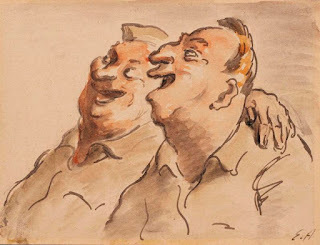
The internet is practically an engraved invitation to indulge in gossip and rumor. It's so easy to blurt out whatever thoughts come to mind. Once posted, these thoughts take on the authority of print (particularly if they appear in some book-typeface-like font). Have you ever noticed how much easier it is to question something when it appears in Courier than when it's in Times New Roman? For the poster of the thoughts comes the thrill of instant publication. Only in the aftermath, when untold number have read our blurtings and others have linked to them, not to mention all the comments and comments-on-comments, do we draw back and realize that we may not have acted with either wisdom or kindness.
To make matters worse, we participate in conversations solely in print, without the vocal qualities and body language that give emotional context to the statements. I know a number of people who are generous and sensitive in person, but come off as abrasive and mean-spirited on the 'net. I think the very ease of posting calls for a heightened degree of consideration of our words because misunderstanding is so easy.
I've been speaking of well-meaning statements that inadvertently communicate something other than what the creator intended. I've been guilty of my share of these, even in conversations with people with whom I have no difficulty communicating in person. What has this to do with gossip?
Gossip is either one of the forms of glue that bind a community together -- "news," as it were -- or else a pernicious form of social control, of putting people down/who's in-who's out/of taking glee in the misfortunes of others, of basking in reflected and unearned glory.
Where this is leading is that such statements can be hurtful and damaging whether they are true or not. They are particularly embarrassing to the tellers when they are false and that falsehood is revealed. Human beings are peculiar creatures. When we have injured someone by passing on a rumor, false or not, instead of doing what we can to ameliorate the situation, we set about defending ourselves. "But it was true!" is one tactic, or "I didn't know!" or "Blame the person who told this to me!" Or we find some way to shift responsibility to the person who is the subject of the gossip. Even well-meaning people, people who see themselves as honest and kind, people who should have known better than to spread rumors, do this.
I believe that when we engage in gossip or rumor, we damage not only the person we have spoken ill of, but the bonds of trust in our community. We divide ourselves into those who are safe confidantes and those who are tattlers, between those who are willing to give us the benefit of the doubt and those who will use any excuse to criticize and condemn us.
A huge piece of the problem, in my experience, is that we are inundated with role models of gossipers. We are told overtly and covertly that it is not only acceptable but enjoyable to speak ill of others and to relish their misfortune. If they have no discernible misfortune to begin with, well then we will create some! If media portray the pain of those who are gossiped about, it is often to glorify retaliation in kind. Almost never are we taught what to do when we speak badly. Saying "I'm sorry," or "Shake hands and make up," (as we're forced to do as small children) does not make amends.
Certainly, we must begin by looking fearlessly at what we have done or said (or left undone and unsaid), but we must also be willing to accept that there is no justification for our behavior. It doesn't matter if what we said was true or not if it harmed someone. It doesn't matter if we were hurting or grieving or too Hungry-Angry-Lonely-Tired.
What we have done does not make us unworthy, unlovable, inadequate, or anything except wrong. Good people can be wrong. Good people, when wrong, strive to make things right.
When we do this, we strengthen not only our relationships and our communities, but our own ability to choose better next time. As we have compassion for others, we owe ourselves compassion -- not excuses, not defenders, not "who's on my side," but gentle understanding, encouragement, patience, and courage.
Photo by Rebecca Kennison, Gossips in the Altstadt in Sindelfingen, Germany, licensed under Creative Commons.
October 8, 2021
Short Book Reviews: Carrie Vaughn's Questland
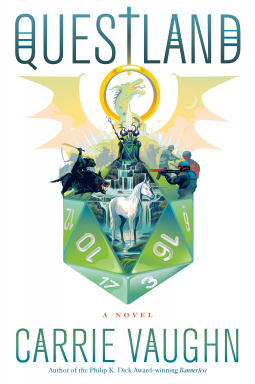
Questland, by Carrie Vaughn (Mariner)
I’m not a gamer, but I belong firmly in the camp of those who’ve longed to run away to Narnia or Middle Earth, or to ride a unicorn or cross wits with a sphinx. Imagine an entire island amusement park where such adventures come alive! Add high tech monsters and characters and you’ve got a sure hit. What could possibly go wrong? (Shades of Jurassic Park?) To begin with, even before Insula Mirabilis can go online, it goes offline. As in, breaks off all contact with the outside world. When a Coast Guard ship attempts to investigate, it crashes into an invisible force shield and is destroyed. Suspicion for this technological insurrection falls on Dominic, the head designer. At this point, the eccentric billionaire genius behind the project puts together a mercenary team to infiltrate the island and bring it back under his control. He enlists Addie Cox, a literature professor and ardent gamer with special expertise in legends and mythology, to help the team negotiate the built-in quests. The mercenaries, initially skeptical about Addie’s value, soon realize they are in over their heads. Insula Mirabilis is neither predictable nor safe, especially when they venture into areas where the foundational stories break down and supernatural creatures run amok. But Addie’s expertise is not the only reason she’s been offered the job: Dominic, the head designer, is her ex-boyfriend, and she’s probably the only one who can get through to him.
Smooth prose, fascinating details, and pitch-perfect pacing mark this, as other novels by Carrie Vaughn, as a book that will swallow you up in the most satisfying way.

October 4, 2021
A COVID loss: anger, grief, and healing
 The COVID-19 pandemic has been raging for many months now, marked from the onset by lies about the disease, its origins, its treatment, and its prevention. No aspect of the pandemic has been free from controversy and misinformation. In the middle of flame wars and whack-a-mole efforts to squelch anti-vaccine, anti-mask internet sites lies the confusion and grief of those who have lost loved ones to this disease (over 700,000 in the US and 4,800,000 worldwide).
The COVID-19 pandemic has been raging for many months now, marked from the onset by lies about the disease, its origins, its treatment, and its prevention. No aspect of the pandemic has been free from controversy and misinformation. In the middle of flame wars and whack-a-mole efforts to squelch anti-vaccine, anti-mask internet sites lies the confusion and grief of those who have lost loved ones to this disease (over 700,000 in the US and 4,800,000 worldwide).
Like many others who believe in science, I was first puzzled and then appalled by the cloud of outright falsehoods that grew up around vaccination. Refusing the vaccines based on illogical and unfounded internet rumors struck me as downright suicidal. Equally troubling were the friends who bought into those lies.
One was a long-time, very dear friend, who had supported me through dark times and whom I had supported in turn. Early in 2020, L told me that she didn’t trust the mRNA vaccines and besides, she thought she’d had a mild case of COVID-19, although she was never tested. But she was diligently wearing a mask at work, and it was clear that further discussion would only be confrontational, so I backed off. For the next year, all appeared to be going well. Then she moved to another part of the country, one with low vaccination and mask-wearing rates. I heard from her while she was waiting at an urgent care center for a persistent cough. Her COVID-19 test was positive. A few days later, she was admitted to the ICU. We talked and texted frequently as her condition deteriorated. After a week and a half, she was placed on a ventilator. She died two weeks later. Her last text to me was, “I love you.”
During her hospitalization, I felt not only growing concern for her, but anger. Anger at so many things. After her diagnosis, I wanted to scream at her, “How could you fall for that conspiracy nonsense?” Then my fury spread to everyone who spread those lies, manipulated statistics, and otherwise terrified people into refusing the one thing proven to save their lives. Anger at the last administration and the former president, who failed to take action at the onset of the pandemic. Anger at the officials in her state for their lax measures and cavalier attitudes to the virus. Anger at everyone who touted ineffective remedies in order to make a profit. And most of all, guilt that I hadn’t pressed the vaccine issue harder and been persuasive enough to save my friend’s life.
Grief mixed with anger and guilt isn’t logical. Nor is it simple.
While my friend was still alive, I realized how unhelpful it would be to be angry with her during her illness. The time to discuss vaccines was after the crisis, not when she was fighting to breathe. Armed with these thoughts, I did my best to work through this particular piece of anger or at least put a dent in it. I also talked myself through my part in what happened and acknowledge that there was nothing I could have done. The choices were hers, as were the consequences. But I believe in harm reduction. The price of making stupid decisions should not be death, although with COVID-19 it all too often is. I hoped that eventually my friend would have come around to getting vaccinated, but she ran out of time. Now I’m just sad.
My opinion of the anti-vaxxers hasn’t budged. I’m angrier and less patient with them than I was before. I still want to blast them with their responsibility for the death of my friend and so many others. I don’t go all-out on this, however. I have more important emotional work to do, mourning the loss of my friend.
When something bad happens, we try to make sense of it. We look around for someone to blame. Anger is part of grief, sometimes a greater or a lesser part. Whether it’s “F!ck Cancer” or coping with the murder of someone you loved, it’s there. In the case of COVID-19, it would be so easy to say, “What happened to you is your fault.” We don’t do that for other disease (although people with lung cancer know how readily others assume they smoked) or for violence or accidents or old age. It’s also true that if the folks who died from COVID-19 had been vaccinated, they would likely have had only a mild case. What do we, who loved them, do with our anger that doesn’t “blame the victim”?
I’m still in the middle of that process, but this I know: It’s complicated.
And yet we human beings have the capacity to hold two incompatible thoughts at the same time, or in this case, incompatible feelings. I know from my own experience that my greatest ally is time. Time for adrenaline to drain away; time for fond memories to arise; time for sorrow and sadness to gentle the hard edges of outrage.
I once said that before this pandemic has run its course, we will all know someone who died. I didn’t know it would happen to me so soon. I wish I’d been wrong. I wish everyone who’s promulgating those deadly lies would step back and realize they’re killing people. I wish everyone I care about would trust the science and get vaccinated. I wish I could just grieve and not have to deal with the anger.
But I do, and I will.
That’s part of the deal.

October 1, 2021
Short Book Reviews: The War of the Djinn
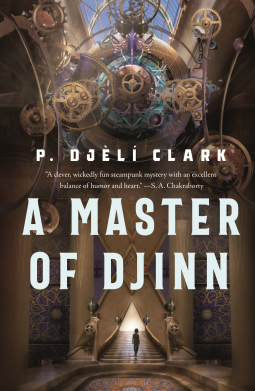 A Master of Djinn, by P. Djèlí Clark (Tordotcom)
A Master of Djinn, by P. Djèlí Clark (Tordotcom) What a luscious book! Part mystery, part thriller, part love story, part alternate history, set in 1912 Cairo. A generation ago, a great magician styled Al-Jahiz opened the door to the realm of supernatural creatures like djinns and angels. In response to the influx, the Ministry of Alchemy, Enchantments and Supernatural Entities acts as police, investigators, and regulators. Enter Fatma el-Sha’arawi, the youngest woman working for the Ministry, who is called to investigate the murder of a member of an aristocratic British cult devoted to Al-Jahiz. That same legendary figure is now stalking the city, gaining ever more numerous and more violent followers. Perhaps his most terrifying power is his ability to control the djinn, even those integrated into human society. Even the mightiest of demons. (Even the charmingly OCD djinn Ministry librarian.)
Balancing breathless action, escalating peril, and plot twists with quieter human moments, evocative details of daily life in an invented world, and the slow unfolding of the heart is always a challenge. Pace and momentum, though, are not the only story elements that hook a reader and keep us going. Clark succeeds on all levels, using effortlessly vivid prose, multi-dimensional characters, and gorgeous world-building.




